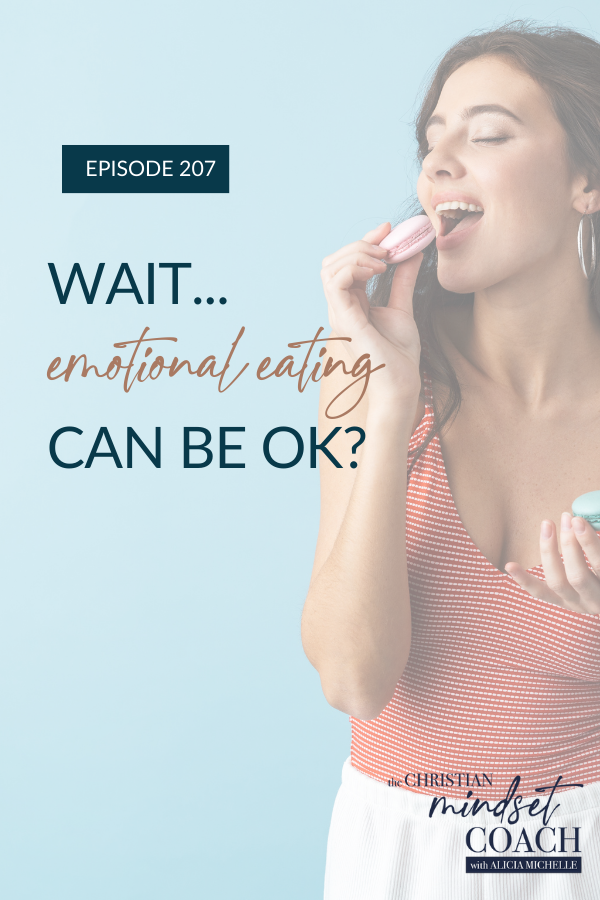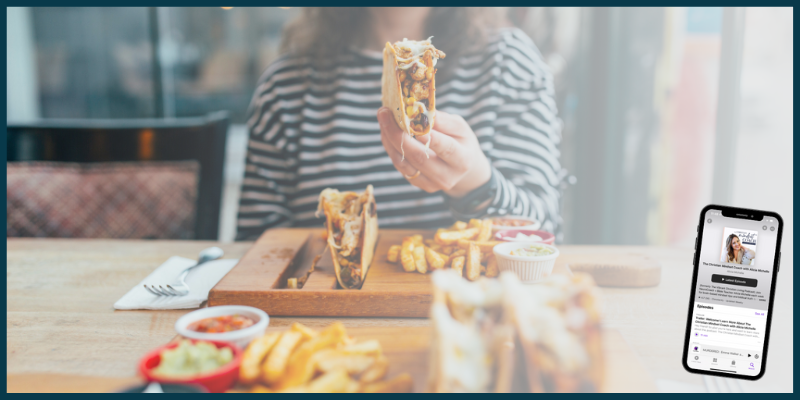When we hear the phrase “emotional eating,” it typically comes with a negative connotation, meaning that we are doing something wrong if we have an emotional tie to food. On today’s episode, Health coach for Christian women Katrina Sequenzia brings a mind-blowing perspective to the table. Join Alicia and Katrina as they discuss God's purpose for food, the dark and light sides to emotional eating, and other steps we can take when managing emotions.

WHAT YOU'LL LEARN:
- [03:13] Why we turn to food to manage emotions when we know God is the answer
- [10:54] Emotional eating as a coping mechanism
- [14:57] A reminder to give yourself grace if you’re struggling with emotional eating
- [17:38] How to discern between “good” emotional eating and potentially damaging experiences
- [21:54] What gets in the way of seeing food as God intended
- [23:52] Tips for managing emotions and emotional eating
- [29:13] A recap of our conversation on emotional eating and other insights
[03:13] Why we turn to food to manage emotions when we know God is the answer
There are many reasons that we are drawn to food for comfort when we’re in the midst of managing emotions, including body, mind, and spiritual reasons. All three of those reasons have important implications.
First, it’s important to note that we are genetically wired to use food to regulate our emotions. It’s the definition of emotional eating and it’s the way that God created us.
As Christians, we may feel some confusion around this because our first thought would be that we should only be seeking God for comfort, but he made us emotional beings, and he created us to be naturally, instinctively, genetically, physiologically, and psychologically wired to use food to regulate our emotions. Emotional eating is simply a part of being human.
There are many healthy ways we connect to emotional eating. Going out to eat on a date with your spouse is considered emotional eating. Food is present as a part of the celebration at holidays like Christmas and Thanksgiving dinner. Even as infants, we see how food can be used in a positive way to help regulate emotions, as a crying baby can be comforted from a botte. These are the ways in which we can see that food is meant to be enjoyed. Emotional eating is perfectly natural, until it becomes problematic.
Where we run into trouble with managing emotions with food is when we find ourselves in painful, uncomfortable emotions. Our brains want to avoid pain and seek pleasure, so we’re drawn to the instant gratification of enjoying food to avoid dealing with that discomfort. These are the moments we need to be seeking God.
[10:54] When emotional eating becomes a coping mechanism
Like anything good from the Father, there is a slippery slope we can find ourselves on if the gift isn’t used in the intended way. In this way, emotional eating can become problematic even though we were designed to find pleasure in food. Food is meant to be enjoyed in a way that honors the Father. We are eating with the Father and thankful for His good gifts.
The problem comes when we're eating in the dark, in hiding or in isolation (literally or metaphorically). When food becomes a coping mechanism instead of something to enjoy, we begin to see the enemy’s twist on God’s gift to us.
For most of us who emotionally eat, it’s something that started in childhood or early adulthood, where we didn't really have the maturity to handle and process our emotions or trauma, and food became a solution for us. We have to remember that no food, no diet or no sugar fast is going to help us to overcome childhood trauma, Katrina says. We have to learn how to not only make sense of that trauma as an adult, but then also learn new strategies to process our emotions in a healthy way.
[14:57] A reminder to give yourself grace if you’re struggling with emotional eating
If you’re struggling with managing emotions with food, it’s important for you to know this: You're not broken. There's not something wrong with you. You need to acknowledge that when you first started reaching for food for comfort instead of God, you were simply doing the best you could at the time.
We are not taught how to reach for God for comfort. Katrina shares that she has no memory of ever being sat down as a child and being told to seek God for comfort instead of food. These habits that we form, these poor coping mechanisms, are often learned. As an adult, give yourself grace, understand that you were doing the best you could, and acknowledge that now it’s time to begin the process of learning healthy coping strategies so that you can enjoy food the way that God intended, Katrina advises.
[17:38] How to discern between “good” emotional eating and potentially damaging experiences
We know that the enemy can corrupt what God intended for us, like with the gift of sex inside of marriage versus pornography, but how do we make that distinction with food? Katrina shares that it's important to first go back to the very beginning and recognize that the enemy has been using food from day one. After Jesus was in the desert for 40 days, the very first thing the devil tried to tempt him with was food. He knows our weakness and he knows how God created us, so he knows our frailty. Because of that, we need to have the awareness that food can become an issue.
Katrina believes that for most people, emotional eating comes down to an issue of attachment or idolatry. We need to ask ourselves if we are attached to a point where we are unwilling to give something up for God. Are we eating in the dark or in the light? What do we feel when using food to manage emotions? These questions can help us understand if we are enjoying God’s creation or if we are using it to cover up something that needs to be addressed at a deeper level.
[21:54] What gets in the way of seeing food as God intended
Alicia asked Katrina to dive a bit deeper into the guilt behind emotional eating, as many women she has worked with have struggled with diets and feeling like they're “not supposed to eat” carbs, sugar, or other ingredients.
Katrina believes that the diet rules we’ve grown up with and have attached to as adults need to transform into a new relationship with food. There is a need to shift from the “this is good, bad, too many calories, carbs, fat, or sugar” perspective to something different. She finds that we use “should” and “shouldn’t” often with food, creating limitations that begin to pervert the Lord’s gift to us. Instead Katrina shares that what we want to do is begin to see food as God intended, which is His glorious gift to us from His marvelous creation. His gifts were meant to be enjoyed. He gave us a feast of foods to delight our senses, and we will be feasting in heaven. Food is talked about throughout Scripture, so we must remember where food fits into our relationship with the Lord.
[23:52] Tips for managing emotions and emotional eating
If you’re ready to create a new mindset around food, to see it not just nutrition or comfort but also as an opportunity to explore the good gifts that God has given us, Katrina shares a few tips that she uses with her clients.
We need to recognize that most of us are going to want to combat emotional eating, comfort eating, with either deprivation or a diet, but there’s no quick fix here. These habits of emotional eating, managing emotions through food, are happening on multiple levels of mind and spirit, and they need to be addressed.
Katrina shares that we have to invite God into the journey of our relationship with food and stop compartmentalizing. Food and God are not separate. There is a prayer that she gives all of her students, which can be found in her starter kit, that guides them through a day by day journey of learning to rely on God for the path to freedom. It’s about recognizing our human state, weakness, and dependence on God, and inviting Him into the process on a daily basis.
You can find more information about Katrina’s starter kit here.
[29:13] A recap of our conversation on emotional eating and other insights
What an encouraging conversation to have around food and emotional eating, especially when we're told so often that food is bad, or only certain foods are good. This conversation with Katrina felt like a veil was stripped off around the lies the enemy tells us about how we should feel shame or operate a certain way around food.
God created something good in our emotional connection to food and yet it can be twisted to be something else. Alicia hopes that this conversation encouraged you and provided a few “light bulb moments” for you like it did for her. If you feel ready to explore the topic of emotional eating a little bit more then check out Katrina's resources here.
MENTIONED AND OTHER RELATED EPISODES:
171: It’s Time to Take Responsibility for Your Anxiety + Discover More Calm
193: 6 Negative Self Talk Phrases to Eliminate and Replace for More Self Confidence
205: Managing Rejection Pt 1: How Do You Stop Replaying A Hurtful Situation?
Write a 5-Star Rating and Review and Get a Free Gift: 50 “I Am” Declarations ($47 value)!
If you love this podcast, would you take a second to write a five star rating and review? If so, I’d love to send you a free gift: the 50 ‘I Am’ Declarations. This is an audio and written statement of who we are in Christ, and includes Bible verses and powerful statements about identity that you can proclaim over your life.
To get the free gift ($47 value), take a screenshot of your five star rating and review and then email that screenshot to Hello@VibrantChristianLiving.com, and we’ll send you access to the resource! Thank you again for helping us get the word out about the podcast in a bigger way!

